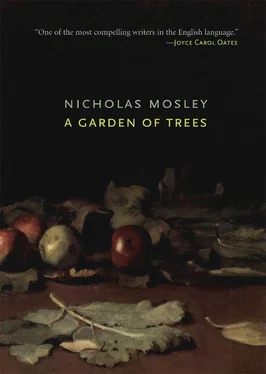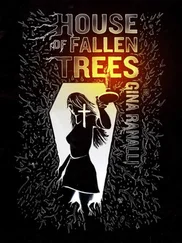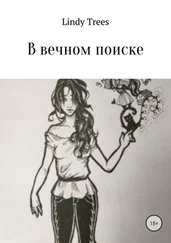“It was copy-book stuff,” I said.
“But I felt such a fool.”
“I suppose that’s not a bad thing to feel.”
“No,” he said. “I say, are you going to be sick?”
“Yes,” I said.
“The awful thing is that they are really so nice. Why are you going to be sick?”
“I have been racing Annabelle,” I said.
“She always races people. I have got to play squash with them on Wednesday. She beats people and then they worship her and it is very bad for her really.”
“Same as you,” I said.
“Yes,” he said. “But she is such a flirt, and she has no need to be, and they feel so uncomfortable, and it is a bloody silly flirt act really. She didn’t beat you, did she?”
“No,” I said.
“Perhaps she does it as a counter-flirt act. They get such blisters. She runs very fast, you know.”
“Yes,” I said.
“I should go and be sick if I were you.” He came with me to the cloakroom. “We always seem to be together in lavatories,” he said. He leaned against the wall and this time looked rather sad. “Wouldn’t it be terrible not to be able to run?” he said.
“Yes,” I said.
“It is all nonsense, I suppose, sticking our necks out and getting them chopped off and having to go dancing round putting them on again. I don’t know why we do it except that there is nothing else to do and every now and then something happens. When you’ve lost your neck you feel better and it seems to have been worth while. She didn’t give you a start, did she?”
“I gave her twenty yards,” I said.
“That’s not bad,” he said. He sat down on a wash-basin and crossed his legs. “Every now and then something happens. I had some men in the army, once, and we were very depressed, and then we were doing river crossings and I organized a boat race and we got so excited that we went out to sea. It was a beautiful blue day and we were all singing and we paddled right out past Portland Bill and bumped the people in front, and I am sure that then something happened. We were laughing and making those sort of jokes, you know, and it was a beautiful blue day and there were seagulls that followed us with their wild unearthly cries. There was a man on the shore who was waving and waving and we got into terrible trouble. I am sure something happened. We were never depressed, not really depressed, after that. Twenty yards in how many did you give her?”
“About a hundred,” I said.
“That’s very good. And then there was a man at Oxford, he was my tutor, quite a nice man, really, but he used to talk to me and I was trying to tell him what I thought and why I did things, and he just looked at me with that dreadful nervous calmness that dons have, you know, and he said, ‘Salvation by romps is not a credible concept,’ just that, and I knew he was wrong but I couldn’t tell him because he looked so sad. Are you feeling better now?”
“Yes,” I said.
“I am sure he was wrong because otherwise you cannot let yourself go, and that is what salvation is, I am sure, it is only when you have gone or at least are ready to go at any moment that you can hope to know about salvation. It is like being in a car going down a hill when the brakes fail, then you have got to jump for it and unless you have been ready for that moment all your life and are good at jumping then you will not jump and you will land up in a heap at the bottom. I think that everyone starts off their life in the seat of a car and there is always a time when the brakes do fail. When you jump I do not know where you will land, but at least you will not land in the heap of old iron. There is always a precipice at the bottom, you see. I am glad that you are in love with Annabelle.”
“Thank you,” I said.
We went back to the party. Peter rejoined his group of guardsmen, and Annabelle was dancing with Freddie Naylor. I sat on a chair beneath a chandelier and the gilded room blinked at me. Pink and blue dresses and the old women with their powdered necks and the men slightly tufted like thistles. There was a nostalgia in the air like Christmas decorations. Fairy faces glittered above tinsel strings of lace, tasseled stars expanded into rings around the roof. Here the world was running downhill with all the elegance at its disposal. The band squeezed moisture from smoky eyes and stiff limbs jolted. Here the world came to forget and I to remember.
The car that runs downhill (the talk like tossed coins) runs and you decorate it and you hang it with bells (the counterfeit phrases that do not ring) you take out of old boxes old bangles and bells you hang on a tree. You come to admire and little bulbs mutter and sometimes the lights fuse and sometimes they don’t. You do not know whether you have come to forget or to remember. Afterwards the bangles are put back into boxes and who puts them is forgotten. The car that runs downhill is always running and it is not easy to remember.
A nostalgia of trees. In a forest of firs there is always memory. The dance is an autumn to disarm the eyes. In water there is memory. The band is a deepness to deceive the ears. The trees are on the roadside where you do not stop.
When you jump you jump, but that has nothing to do with you, when you remember you remember there is something to be done. The tree on which tinsel is hung is an altar. What you do you do in memory, and when you have done it all things are possible and they are possible because you have done it. A garden of trees and a garland of tears. You come to put flowers on the altar and then the flowers of the garden will not die and in memory of the garland you can live. On the road there is the death and the suffering and the car that runs downhill and the trees have gone past you, the trees have gone past you, but still you can live. Only there is something to be done, which you can do, and then you can jump, which has nothing to do with you. You can offer your garland. At the centre of the garden is an aquarium and a tree.
“Are you asleep?” Annabelle said.
“Yes,” I said.
“Will you dance with me?”
“I must go and find Marius,” I said.
She came with me to the door. The streets were wet and reflected in silver. I walked to Grosvenor Square and rang the bell of the flat. There was no one there. I went out into the square and sat on the parapet.
The patterns of the day were reflected in water. It was very cold. A shape like an iceberg, with only a fraction visible. I withdrew into my clothes as into a shell. Beneath the surface the iceberg stretched and its bulk was enormous. The hospital and Marius and the hospital again. I could not see it. It was apart from me, beneath the surface, a receding opaqueness in the depths of the sea. Each time I searched for it, it disappeared and I saw only the image of my face in the waters. I waited. When I searched my face the waters broke it; when I searched inside me the cold deceived it. My clothes enclosing nothing like an empty shell.
But the touch was there and was jagged against my hands. When you look inwards you see nothing except that which you have imagined, and when you look outwards you see only a fraction of what is real. But if you put out your hand to this fragment and touch it then at least you will have the feel at your fingers, and if you put out your heart to this fragment and love it then you will have the feel of your heart. This is a rarity. You do not have the feel of your heart by keeping it within you. “Who am I?” Marius had said.
Your heart within you is what you can never feel; your heart outside you is what you know. What you are is a relationship between yourself and others. What I am is that which exists between the four of us, I thought, and thinking this I said it aloud, suddenly. The sound of my voice was like an explosion, frightening. I sat up and looked around me. There was nothing except the lights like icicles. What I am is that which exists between the four of us. The iceberg was there, in the darkness, and I could not need to see it.
Читать дальше












